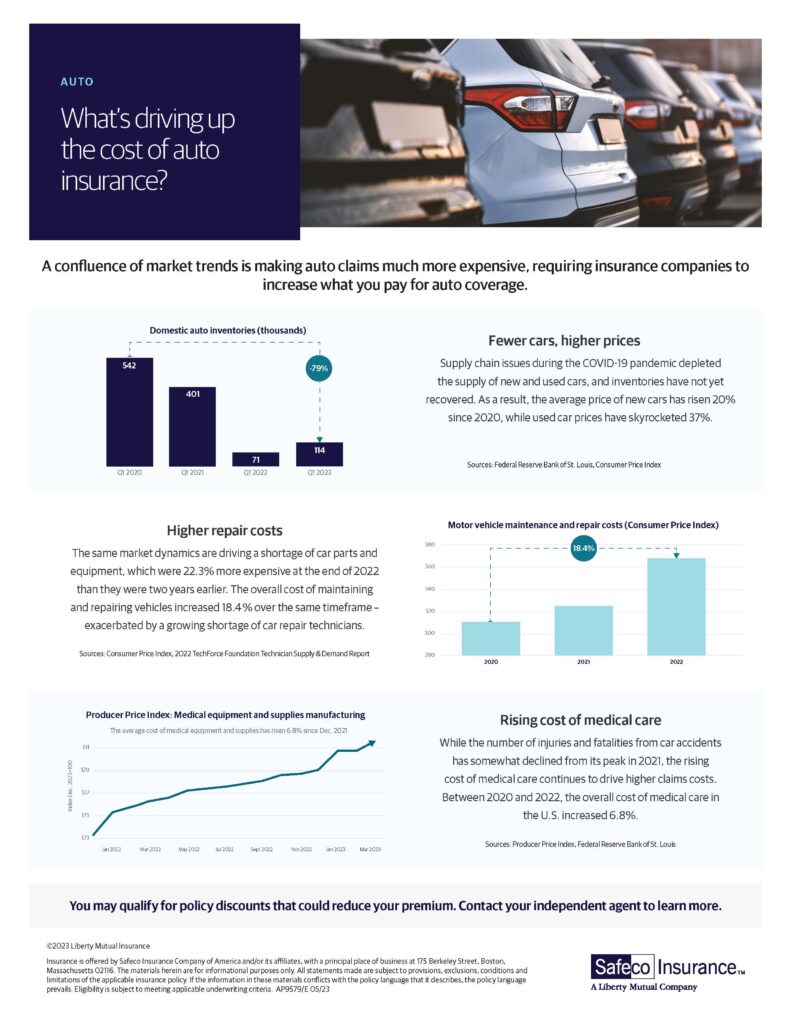Are you feeling overwhelmed every time your insurance premiums renew? Honestly, we are too.
It’s no surprise – insurance rates are consistently on the rise. Whether it’s auto, health, or life insurance, costs have been steadily climbing for quite some time. In this post, we will focus specifically on rising auto and home insurance costs in Colorado, exploring the factors contributing to these increases and offering some tips on how consumers can prepare themselves for the financial impact.
Understanding Rising Insurance Costs:
- Inflationary Pressures:
One of the primary reasons for the rise in insurance costs, including auto and home insurance, is inflation. Inflation refers to the general increase in prices of goods and services over time. As the cost of living rises, insurance companies need to adjust their premiums to account for the increased expenses they incur in providing coverage. In recent years, the United States has experienced modest inflation rates, contributing to higher insurance costs across the board.
- Insurance Company Losses:
Another factor impacting insurance costs is the losses incurred by insurance companies. Insurance providers rely on premiums collected from policyholders to cover the costs associated with claims, administrative expenses, and maintaining a profit margin. When insurers experience significant losses due to catastrophic events, such as natural disasters or an increase in claims frequency or severity, they may need to raise premiums to compensate for these financial setbacks. In Colorado, the state is prone to natural disasters like wildfires and hailstorms, which can lead to higher insurance costs for homeowners. Nationally, property and casualty insurance companies experienced losses totaling $8.2 billion in the first quarter of 2023.
- Increased Costs of Repairs and Medical Services:
Auto insurance costs have also been affected by the rising costs of repairs and medical services. With the advancement of technology in vehicles, repairs have become more complex and expensive. Additionally, healthcare costs continue to rise, resulting in higher medical payments and bodily injury claims in auto insurance policies.
Coping with Rising Insurance Costs:
- Bundle Your Policies:
Consider bundling your auto and home insurance policies with the same provider. Insurance companies often provide discounts to customers who purchase multiple policies from them. Bundling can help you save on premiums while simplifying the insurance management process.
- Maintain a Good Credit Score:
Believe it or not, your credit score can impact your insurance premiums. Insurance companies use credit-based insurance scores as one factor in determining rates. By maintaining a good credit score, you may be eligible for lower premiums.
- Increase Deductibles:
Opting for higher deductibles can lower your insurance premiums. However, before making this decision, ensure you have enough savings to cover the higher deductible in case of a claim.
- Take Advantage of Safety Discounts:
Insurance companies often offer discounts for safety features installed in your home or vehicle. Installing burglar alarms, smoke detectors, or anti-theft devices can help reduce premiums. Similarly, safe driving habits, such as completing defensive driving courses, can result in discounts on auto insurance.
In recent years, insurance companies have introduced innovative ways to monitor driving habits through smartphone apps, offering additional discounts to policyholders. By leveraging technology, insurers can track various aspects of a driver’s behavior, including speed, acceleration, braking, and even distracted driving. These apps use GPS and other sensors to collect data, allowing insurers to gain insights into an individual’s driving patterns and assess their risk level more accurately. By demonstrating safe driving habits, policyholders can qualify for additional discounts on their auto insurance premiums. This approach not only benefits responsible drivers by rewarding their good habits but also encourages safer driving practices overall, creating a win-win situation for both insurance companies and their policyholders.
As insurance costs continue to rise in Colorado and across the nation, it’s crucial to stay informed and take proactive steps to manage these expenses effectively. Understanding the factors contributing to increasing insurance premiums, such as inflation and insurance company losses, empowers consumers to make informed decisions. By bundling policies, maintaining a good credit score, increasing deductibles, and taking advantage of safety discounts, you can mitigate the financial impact of rising auto and home insurance costs. Remember, staying prepared and informed is key to navigating the ever-changing insurance landscape.

